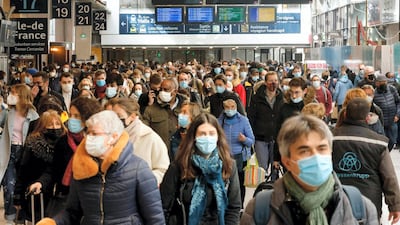Two weeks ago, Dr Gianluca Pescaroli was sitting at a table drinking coffee in the picturesque Italian university city of Bologna watching crowds of its 50,000 students enjoy the sunshine and freedom. Some were wearing masks, some not.
“It’s happening again,” the lecturer in disaster reduction at the University of London said to his wife. “In two weeks, we will be back in lockdown.”
As Europe hurtles into its third coronavirus wave, a new round of curfews and restrictions has been enforced. The outbreak comes amid a stumbling vaccination programme and bitter words with drugmaker AstraZeneca and the UK over delivery schedules. EU leaders will hold an online summit on Thursday to decide whether to proceed with the threat to block exports to Britain.
Mainland Europe is under assault from at least three Covid-19 variants which appear to be running rampant, each of them more virulent and deadlier than the original Sars-CoV-2 coronavirus.
Dr Ilan Kelman, professor of disasters and health at University College London, is warning governments they must take a “very cautious” approach.
"I'm extremely concerned about the horror of the pandemic in Europe, which now has a major problem," he told The National. "We need a lockdown, even with people's tempers fraying – which is understandable – but the fact that restrictions are not being fully implemented in the UK or the rest of Europe is very concerning."
Prof Graeme Ackland of the University of Edinburgh told The National that Europe's death toll, which the European Centre for Disease Prevention and Control says has reached almost 900,000, may hit 1.5 million this year.
The forecast is predicated on Europe entering a strict lockdown and the vaccination programme progressing at its current pace. That may be hampered by public sentiment.
A YouGov poll published on Monday suggests that trust across Europe in the Oxford-AstraZeneca vaccine’s safety plunged to its lowest yet after concern was raised over whether it could cause blood clots. In Germany, France, Spain and Italy, members of the public surveyed were more likely to consider it unsafe than safe.
With the UK, South African and Brazilian strains now gripping the continent, infection rates are soaring. Fear is growing that the continent will experience a wave similar to Britain’s in January, when Covid-related deaths rose by 43 per cent, from 74,000 to 106,000.
After spending all of 2021 in shutdown, Britain reported a 7 per cent drop to 5,300 new infections a day last week, down significantly from its high of 60,000 in mid-January. Deaths and infections have plummeted in Portugal, which, like the UK, entered a strict lockdown in January.
Prof Ackland, who was the first statistician to highlight the virulence of the UK strain publicly, said new strains will be largely responsible for devastating new surges.
"Sadly, this will be just as infectious in Europe," he told The National. "And the Europeans don't seem to be publishing or measuring the different strains they are getting."
Quite how bad it will be depends on the success of government restrictions and continued vaccination.
“It really depends on how much of a lockdown there is in Europe,” Prof Ackland said. “They will have a fairly high coverage of vaccination but this summer might be the last really big wave of death.
“Then in the winter there’s enough time for another sizeable wave, which would take us to 1.5 million deaths, maybe. It’s very, very dependent on what actions the governments take.”
Some countries are already taking action. France, Poland and Germany rapidly introduced new restrictions. But others, such as Portugal and Denmark, are easing social limitations.
That might change as the third wave takes hold. Germany, where the UK strain is now dominant, experienced a 49 per cent rise to 12,700 cases a day in the past 10 days. It is expected on Monday to extend its lockdown into mid-April.
Poland recorded a 59 per cent rise in cases to an average of 21,000 day in the same period, and there was a steady rise in France, where daily infections grew to more than 30,000, a 40 per cent rise. Last week, France brought in tougher restrictions for the Paris region after failing to stem increasing case numbers.
Guislaine David, spokeswoman for a French teachers’ union, said the more virulent variant first discovered in south-east England was increasingly being found in schools.
“In France, the authorities are ignoring the role of schools in the spread of the epidemic, despite the fact that it is recognised by scientists,” she said.
The union wants better protection measures introduced in schools and teachers to be vaccinated as a priority.
“The atmosphere is gloomy in France at the moment. In some districts the return to a lockdown is complicated, but it is also complicated in hospitals that have to deal with an influx of patients or transfer some patients to other hospitals,” Ms David said.
“Vaccination is not progressing in France and is not stopping the circulation of the virus, which is delaying the end of the crisis.”
In the two weeks since Dr Pescaroli was drinking coffee in Bologna, a significant rise in cases to 22,600 a day was recorded, as was a 23 per cent increase in daily deaths, to 394.
He believes it will only get worse. “It is a real worry,” he said. “The lockdown has come again but how we survive this really will depend on how much people are fatigued by complying with the rules.”
Recalling the resilience on display a year ago when Italians took to their balconies to serenade their neighbours, he said people were now in a stoic mood.
“No one is singing in Italy any more but everyone must be super-careful again. Just resist another couple of months, then hopefully they will improve the logistics on the vaccine,” he said.
Chiara Magliocchetti, one of the four owners of Pianostrada Laboratorico di Cucina, a restaurant in central Rome, said the situation was difficult.
She said she hoped that with the new three-week lockdown “the rising numbers will be brought down to a minimum just in time for the new delivery of the vaccines”.
But Ms Magliocchetti said the fall in visitors was terrible for the restaurant, in the heart of Rome’s tourist district, only a few hundred metres from the Pantheon and Colosseum.
“The government isn’t giving us the right economic help and the situation is really difficult ... we need money,” she said.

Sweden earned a reputation in forging its own path compared with the rest of Europe, eschewing the strict lockdowns introduced across much of the continent.
Stockholm resident Pernilla Nilheim, who works for a pharmaceutical company, said the comparative liberty of the last year made her happy to live in Sweden.
“We’re all suffering this because we have this hope for the vaccination to really get started.
“The Swedish government said that before midsummer it should be done for all of us, but now with the stop of the AstraZeneca vaccine and with delays in general, this will not be happening.”

She said many people were confused by the messaging around the AstraZeneca shot and whether it is safe. While Ms Nilheim said everyone understands the vaccine is not 100 per cent effective against Covid-19, it would be a move in the right direction.
“It’s one step towards going back to life before. But now, we’re just postponing everything even more. People are really tired and lonely.”
Facing an increasing spread of coronavirus in France, some parents set up the group Ecole et familles oubliées – School and Forgotten Families – campaigning for better safety measures.
“French schools are unsafe,” said group member Elisa. She said she despairs at the limited testing in place, the lack of social distancing measures and lack of proper ventilation in school buildings. Elisa said masks were made mandatory but only after parents fought for their introduction.
“We are worried, angry, furious and frustrated by this situation,” she said. “Government guidelines and their application are clearly negligent and leave everyone unprotected.”
The furore over the Oxford-AstraZeneca shot has amplified vaccine hesitancy across Europe. The bloc is dependent on two options for vaccination, the other being Pfizer-BioNTech.
Mounting deaths could yet push Europeans to abandon hesitancy and make their way to vaccination centres.
“The vaccinations will get there eventually, but the issue is how many people we are going to permit to die before we actually get to that level,” Dr Kelman said.
Boris Johnson says Covid-19 spike in Europe likely to ‘wash up on UK shores’
Britain must brace for another wave of coronavirus infections being imported from Europe as cases rise on the continent, the UK's prime minister warned.
Boris Johnson said he expected the third wave of Covid-19 infections to “wash up on our shores as well”.
But Mr Johnson said he did not think the EU wanted to block vaccine exports from reaching the UK, following suggestions Brussels could stop supplies from crossing the Channel amid struggles with its own supplies.
Speaking to broadcasters at BAE Systems in Lancashire on Monday, Mr Johnson said: “I’ve talked to our (European) friends repeatedly over the period. We’re all facing the same pandemic, we all have the same problems.
“If there is one thing that is worth stressing it’s that on the continent right now you can see sadly there is a third wave under way.
“People in this country should be under no illusions that previous experience has taught us that when a wave hits our friends, it washes up on our shores as well.
“I expect that we will feel those effects in due course.
“That’s why we’re getting on with our vaccination programme as fast as we can but a vaccination campaign and developing vaccines, rolling them out – these are international projects and they require international co-operation.”
On Tuesday, he released a further statement on the anniversary of the first lockdown.
“The last 12 months has taken a huge toll on us all, and I offer my sincere condolences to those who have lost loved ones. Today, the anniversary of the first lockdown, is an opportunity to reflect on the past year – one of the most difficult in our country’s history," he said.
“We should also remember the great spirit shown by our nation over this past year. We have all played our part, whether it’s working on the front line as a nurse or carer, working on vaccine development and supply, helping to get that jab into arms, home schooling your children, or just by staying at home to prevent the spread of the virus.
“It’s because of every person in this country that lives have been saved, our NHS was protected, and we have started on our cautious road to easing restrictions once and for all.”















